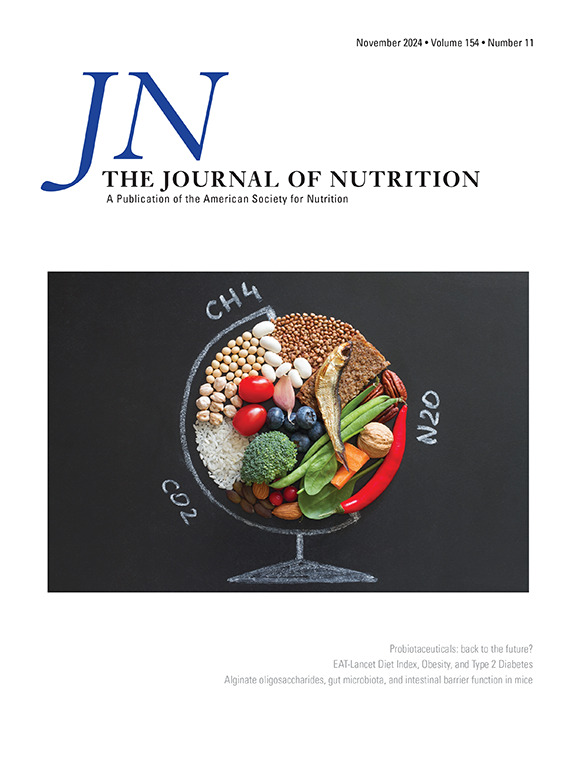在一项随机对照试验中,健康受试者食用富含混合纤维的酸面团发酵羊角面包会影响空腹血糖。
IF 3.7
3区 医学
Q2 NUTRITION & DIETETICS
引用次数: 0
摘要
背景:不正确的生活方式(包括饮食)是导致全球肥胖症和 2 型糖尿病患者急剧增加的原因。增加膳食纤维的摄入量可能会给健康带来益处,而重新配制烘焙食品可能是在全球范围内改善膳食的一种策略:本研究旨在评估与对照组羊角面包(膳食纤维含量为 1.3g/100g,CONCRO)相比,使用含有 10 种来源膳食纤维混合物(4.8g/100g,FIBCRO)的酸包发酵羊角面包作为为期两周的早餐对每日能量摄入、食欲、代谢变量和肠道微生物组的影响:32 名健康参与者被随机分配到两组,分别食用 FIBCRO 或 CONCRO。参与者在两周内每天通过 7 天加权食物日记和视觉模拟量表自我记录饮食和食欲情况。在基线和干预后,除了收集血压、人体测量和身体成分外,还收集空腹血样、尿样和粪便样本。按照官方方法测量血清葡萄糖、血脂、C 反应蛋白和胰岛素,并采用光度法测量血清二肽基肽酶-4 (DPPIV) 活性。尿液中的多酚类物质和尿石素通过 LC/MS/MS 进行分析,粪便中的肠道微生物组通过枪式元基因组学进行分析:结果:与 CONCRO 相比,服用 FIBCRO 改善了空腹血糖(与基线相比,FIBCRO 的平均变化为 -2.0 mg/dL vs CONCRO 的 +3.1 mg/dL,p=0.022),还使血清 DPPIV 活性降低了 1.7 IU/L (p=0.01),尿液中尿石素 A-硫酸盐的排泄量增加了 6.9 ng/mg 肌酐 (p=0.04)。没有发现任何监测变量或肠道微生物组发生进一步变化:结果表明,与传统的酸包羊角面包相比,健康受试者食用两周声称 "膳食纤维来源 "的酸包羊角面包可改善空腹血糖。血清 DPPIV 活性的降低和尿磷脂生物利用率的提高很可能是产生这种效果的原因,而与肠道微生物组的变化无关:NCT04999280 (https://clinicaltrials.gov/)。本文章由计算机程序翻译,如有差异,请以英文原文为准。
Consumption of a Sourdough-Leavened Croissant Enriched with a Blend of Fibers Influences Fasting Blood Glucose in a Randomized Controlled Trial in Healthy Subjects
Background
An incorrect lifestyle, including diet, is responsible for the worldwide dramatic increase in obesity and type 2 diabetes. Increasing dietary fiber consumption may lead to health benefits, and reformulation of bakery products may be a strategy to globally improve the diet.
Objectives
This study aimed to assess the impact of a 2-wk breakfast consumption with a sourdough-leavened croissant containing a blend of dietary fiber from 10 sources (4.8 g/100 g, croissant enriched with dietary fibers [FIBCRO]), compared with a control croissant (dietary fibers 1.3 g/100 g, CONCRO) on daily energy intake, appetite, metabolic variables, and the gut microbiome.
Methods
Thirty-two healthy participants were randomly allocated to 2 groups consuming FIBCRO or CONCRO. Participants self-recorded their diet and appetite through 7-d weighted food diaries and visual analog scales every day over the 2 wk. At baseline and after the intervention, fasting blood and urine samples, and fecal samples were collected beside blood pressure, anthropometry, and body composition. Serum glucose, lipids, C-reactive protein, and insulin according to the official methods and serum dipeptidyl peptidase-4 (DPPIV) activity by photometric method were measured. Polyphenols and urolithins in urines were analyzed by Liquid chromatography–tandem mass spectrometry (LC/MS/MS), whereas gut microbiome in feces by shotgun metagenomics.
Results
FIBCRO consumption improved fasting blood glucose compared with CONCRO (mean changes from baseline −2.0 mg/dL in FIBCRO compared with +3.1 mg/dL in CONCRO, P = 0.022), also reducing serum DPPIV activity by 1.7 IU/L (P = 0.01) and increasing urinary excretion of urolithin A-sulfate by 6.9 ng/mg creatinine (P = 0.04) compared with baseline. No further changes in any of the monitored variables or in the gut microbiome were detected.
Conclusions
Results suggested that a 2-wk consumption of a sourdough croissant claimed as “source of dietary fiber” improved fasting glycemia compared with a conventional sourdough croissant in healthy subjects. The reduced serum DPPIV activity and increased bioavailability of urolithin likely contributed to determine that effect independently from gut microbiome changes.
This trial was registered at clinicaltrials.gov as NCT04999280.
求助全文
通过发布文献求助,成功后即可免费获取论文全文。
去求助
来源期刊

Journal of Nutrition
医学-营养学
CiteScore
7.60
自引率
4.80%
发文量
260
审稿时长
39 days
期刊介绍:
The Journal of Nutrition (JN/J Nutr) publishes peer-reviewed original research papers covering all aspects of experimental nutrition in humans and other animal species; special articles such as reviews and biographies of prominent nutrition scientists; and issues, opinions, and commentaries on controversial issues in nutrition. Supplements are frequently published to provide extended discussion of topics of special interest.
 求助内容:
求助内容: 应助结果提醒方式:
应助结果提醒方式:


